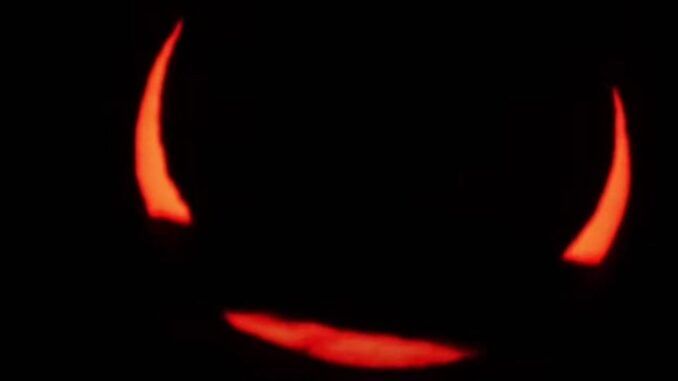
Indiana has become the latest U.S. state to declare a 'State of Emergency' ahead of next week's solar eclipse and relaunch of CERN's particle accelerator.
Governor Eric Holcomb declared a statewide disaster emergency earlier this week in anticipation of the total solar eclipse set to occur on April 8th, 2024.
Thegatewaypundit.com reports: The declaration, effective Wednesday, allows Indiana to utilize resources and aid from other states through the Emergency Management Assistance Compact (EMAC).
This compact is a national mutual aid system which Indiana, along with all 50 states, the District of Columbia, and various American territories, have ratified.
Gov. Holcomb signed the order to address anticipated needs due to the significant influx of tourists. The EMAC members will share equipment and communications systems to help ensure safety during the eclipse-related surge in tourism, the Indiana Capital Chronicle.
Indiana is expecting hundreds of thousands of visitors for the April 8 event, which is also likely to prompt considerable in-state travel. Officials are predicting a “widespread and significant impact” on the state’s “critical infrastructure systems,” including those necessary for communication, emergency response, and transportation.
The governor’s order authorizes the leader of the Department of Homeland Security (DHS) to coordinate any required assistance with other local, state, and federal agencies, ensuring statewide preparedness. This action is a direct response to potential technological or other emergencies that could arise due to the heavy strain on emergency services.
Although Gov. Holcomb has utilized disaster declarations in the past, particularly during the COVID-19 pandemic, there have been tensions between the governor’s office and state lawmakers concerning the extent and duration of such orders.
Despite previous disagreements, the current order is set to end on April 9, the day after the eclipse.
According to the declaration:
WHEREAS,on April 8, 2024, a total solar eclipse will pass directly over the State of Indiana, giving everyone in our state an incredible view of this extremely rare event. The last total solar eclipse to pass over Indiana occurred in 1869, and the next is not expected to occur until 2099;
WHEREAS,it is anticipated the State of Indiana will see a significant influx of several hundred thousand visitors to witness, what will be for nearly all, a once-in-a-lifetime event;
WHEREAS,it is of primary importance to the State of Indiana to be prepared to protect the health, safety, and welfare of the public during this event and to be prepared to swiftly and effectively respond to any emergency that may arise;
WHEREAS, over the last year, state and local agencies have been preparing for this event and it is anticipated there may well be widespread and significant impact placed on Indiana’s emergency response, transportation, communication, and other critical infrastructure systems by this tremendous influx of visitors throughout the state;
WHEREAS, the massive number of people viewing this event in our state may well stress and/or interfere with first responder and public safety communications and emergency response systems such that a technological or other emergency may occur;
WHEREAS, the State of Indiana is a member of the Emergency Management Assistance Compact (EMAC) wherein a member state can, upon a governor’s declaration of a disaster emergency, call upon resources in another state to be on hand or available, which resources are essential to the safety, care, and welfare of the people; and
WHEREAS, other member states of the EMAC have communications and other equipment which can be provided in advance to the State of Indiana so it is in place and able to augment Indiana’s resources should the need suddenly arise in connection with this very large and unique event.
Canada’s Niagara Falls region has also declared a state of emergency to prepare for the upcoming total solar eclipse on April 8th.
In a press release, Niagara Regional Chair Jim Bradley said he issued a state of emergency “out of an abundance of caution.”
Bradley continued in the press release, “Declaring a State of Emergency under the EMCPA strengthens the tools the Region has at its disposal to safeguard the health and safety of residents and visitors and protect our critical infrastructure in any scenario that might arise.”
Ontario Mayor Jim Diodati is expecting the Canadian side of Niagara Falls to receive over one million visitors on the day the eclipse is set to occur, which is the main reason why Niagara officials decided to issue a state of emergency a week in advance before the solar eclipse is set to occur.
Several counties in Texas have also issued emergency declarations in response to the expected heavy traffic and gridlock stemming from the total solar eclipse on April 8.
The Bosque County Office of Emergency Management, on Monday, announced a state of emergency specifically citing concerns over traffic congestion. This declaration empowers the county to implement “any actions necessary to ensure the protection of life, safety, and critical infrastructure.”
The Elyria Township Fire Department also urged the local community to make unusual preparations for the upcoming Total Solar Eclipse scheduled for April 8.
It recommended that residents stock up on food, ensure they have a sufficient supply of their prescriptions picked up the week before, keep cell phone batteries charged, and schedule any necessary appointments for before or after the eclipse weekend.
In response to NASA’s report that a total solar eclipse will occur on April 8, 2024, New York authorities warned New Yorkers to be prepared.
In a recent press release by the New York state police, officials warned residents to be prepared for cellular disruptions, slow 9/11 response times, gridlocked traffic, and food/water demand during the upcoming total solar eclipse.
Also included in the press release was a list of suggestions calling for residents to stock up on food, water, and fuel.
The warning by New York state police comes as the department looks to learn from their responses to the 2017 solar eclipse.
Sean Adl-Tabatabai
Latest posts by Sean Adl-Tabatabai (see all)
Source link

